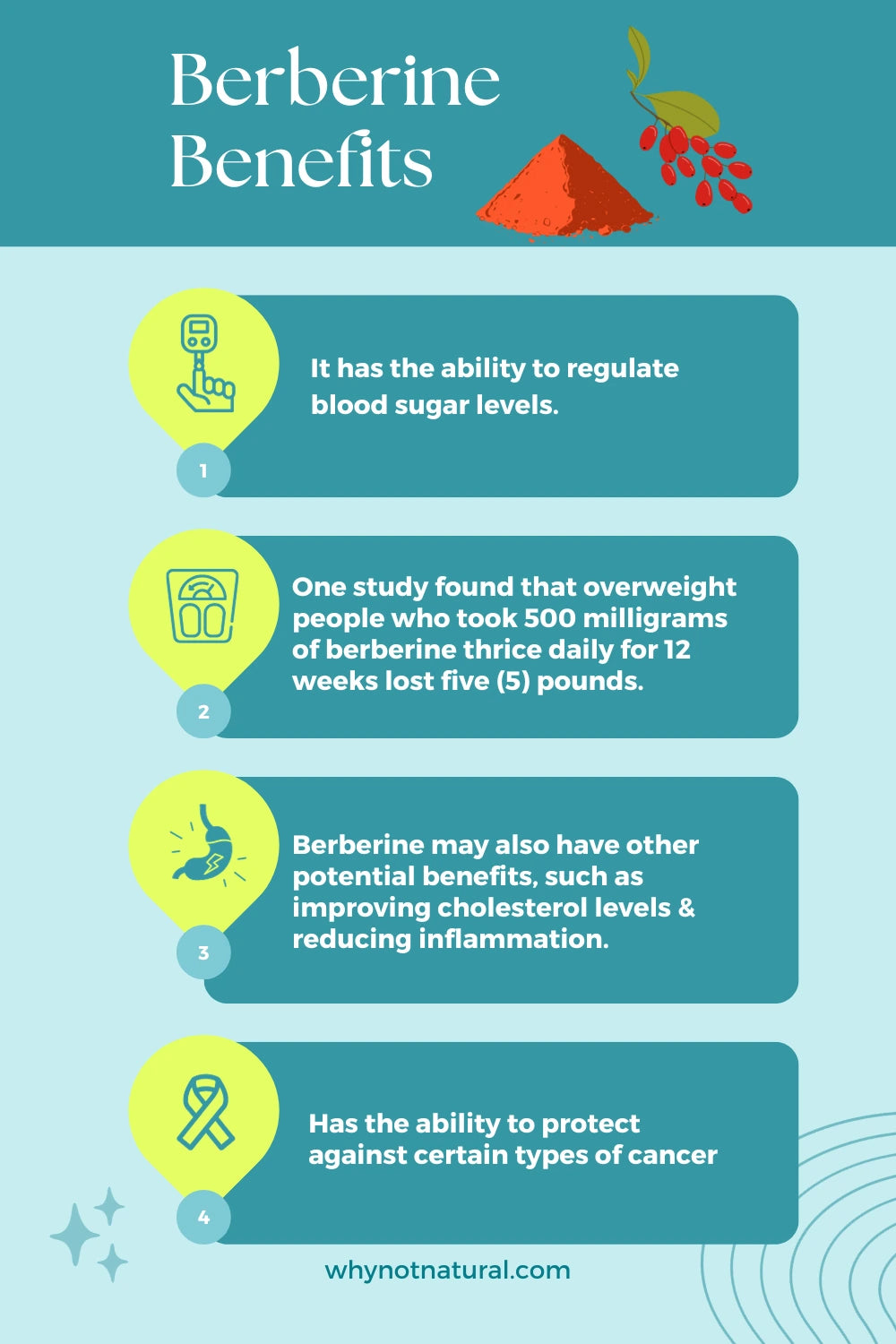

· By Kelin Marquet
Berberine Benefits - Some of Our Favorite
Berberine, a natural plant compound used in traditional Chinese and Ayurvedic medicine for millennia, has gained popularity in the Western world after many studies have proven its potential health improvements, especially regarding blood sugar and weight loss.
Some examples of plants berberine can be sourced from include:
- Oregon grape
- Goldenseal
- Chinese goldthread
Berberine is extracted from these plants' roots, rhizomes, or bark.
Berberine Benefits
One of the primary benefits of berberine is its ability to regulate blood sugar levels. Several studies have shown that berberine can effectively reduce blood sugar levels in those with type 2 diabetes. For example, in one study, participants who took 1 gram of berberine daily for 12 weeks saw significant improvements in their fasting blood glucose levels compared with those taking a placebo (1).
In addition to its blood sugar-regulating properties, berberine has also been shown to support weight loss. It's especially effective for those with a BMI over 30.
One study found that overweight participants who took 500 milligrams of berberine thrice daily for 12 weeks lost, on average, five (5) pounds along with 3.6% of their body fat, compared to a control group that did not take berberine (2).
Berberine may also have other potential benefits, such as improving cholesterol levels, reducing inflammation (3), and protecting against certain types of cancer (4).
When discussing blood sugar and weight loss, several pharmaceutical options are available. However, they come along with nausea, diarrhea, and decreased appetite. Berberine, on the other hand, is generally safe with minimal side effects.
How to Choose a Berberine Supplement
When choosing a berberine supplement, looking for a high-quality product from a reputable manufacturer is crucial. Look for a supplement containing at least 300 milligrams of berberine per dose, and opt for a third-party tested product to ensure purity and potency.
Choosing a supplement with the dosage broken into several capsules is also a good idea. Taking too much berberine at once can cause stomach discomfort, and the ideal way to take berberine is to divide it into smaller doses throughout the day.
Berberine has a short half-life after consumption, so taking it all at once will not only cause side effects like nausea but also potentially minimize the impact you'll feel compared with taking it throughout the day.
Taking a supplement like Why Not Natural's blood sugar and inflammation support capsules (here) provides the synergistic effects of combining berberine with complementary herbs like Ceylon cinnamon and turmeric.
How Long Should I Take Berberine
Berberine is a natural supplement that can be taken over a long period; however, the duration of use may vary depending on the individual's health status and goals.
If you're taking berberine to regulate blood sugar levels or support weight loss, it's recommended to take it for at least 12 weeks to see noticeable results.
However, it's crucial to note that berberine's effects may begin to diminish after prolonged use, so it's a good idea to take breaks or cycle your supplement use.
Berberine is generally considered safe when taken at the recommended dosages.
Regarding long-term use, there isn't a set duration for how long someone should take berberine.
Consult a doctor before trying new supplements, especially if you are taking medication. It's also worth noting that while berberine is a natural supplement, it can still interact with certain medications.
How Much Berberine Should I Take?
As for dosage, studies have typically used doses ranging from 300 to 1500 milligrams per day, divided into two or three doses. However, it's always best to follow the manufacturer's dosage or consult with your doctor.
Some people may experience such side effects as gastrointestinal discomfort, bloating, constipation, or diarrhea. These effects can be minimized by spacing out the dosage and taking a moderate amount. If you experience side effects, try reducing your dose, spreading it out, or taking a break.
Summary
In conclusion, berberine is a natural plant compound that has shown promise in regulating blood sugar levels, supporting weight loss, and potentially providing other health benefits. While pharmaceutical options are available for these issues, berberine may be a safer and more natural alternative.
When choosing a berberine supplement, look for a high-quality product from a reputable manufacturer and follow the recommended dosage instructions. You can read more about the Why Not Natural berberine supplement with complementary herbs here.
Don't forget to subscribe to our newsletter to learn which supplements to take, how to combine them for maximum benefit, and other health tips to boost your energy and vitality. Plus, discover natural strategies to reduce hormonal imbalances, stress, and anxiety. Click here to get started!

Resources
(1) https://www.ncbi.nlm.nih.gov/pmc/articles/PMC2410097/
(2) https://www.sciencedirect.com/science/article/abs/pii/S0944711312001870
(3) https://pubmed.ncbi.nlm.nih.gov/27671811/
(4) https://pubmed.ncbi.nlm.nih.gov/25153862/
